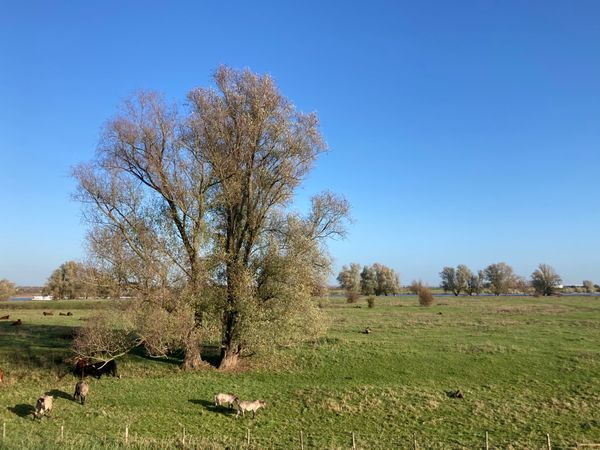Meestal onderhoudend, goed te begrijpen uitleg voor als je je middelbare-schoolbiologie nog kunt herinneren. De anekdotes gaan mij wat veel over zieken en ziektes (en niet hoe het 'normaal' werkt), maar verhelderen wel het onderwerp.
we send a header which is a date set to the beginning of each day:
last-modified: Wed, 30 Nov 2022 00:00:00 GMT
From now on, every time this request is made again, the server receives the date and adjusts it by one second, and returns it to the browser:
last-modified: Wed, 30 Nov 2022 00:00:01 GMTThis way, the server can calculate the distance in seconds since midnight to give us a visit count.
Niks aan de hand, tot je een blokje draait.
This series contain some of Helga's best known works. Playfulness and simplicity of the idea is contrasted by fine details of the fabrics used and of the landscape. Each character has their unique personality, distinctive voice, and a story to tell.
Progressive enhancement assists in web accessibility by encouraging teams to build resilient services.
Over betuttelende technologie:
You can’t solve culture with technology. If you need to rely on software to police your employee’s language, you’ve got bigger fucking problems.
via Paul van Buuren
Prima, had wat korter mogen zijn.
I hope this short read has convinced you of the perils and pitfals of using [closed, closed] intervals. My guess is that the reason people sometimes fall for them is because they look nice and symmetric, and in fact work most of the time.
It's only in the edge cases that they start to break down. But that is exactly how you should evaluate how good a design is: by testing it against the edge cases.
Het derde deel in de "Children of Time" serie. Na spinnen en octopussen, probeert de auteur zich dit keer ook te verplaatsen in kraai-achtigen. Het hoofdverhaal is dat van een gedoemde ruimtekolonie, de hoofdpersoon een algenkolonie in de vorm van een mens.
Uiteindelijk is dit derde deel een verdere verkenning van bewustzijn en intelligentie. Hoe het te definiëren, en of dat uitmaakt. De ontknoping had van mij wat langer mogen zijn. Misschien in deel vier?
A proton should be one of the simplest objects in physics. It’s a basic building block of all atoms, or, alternatively, the simplest possible atom all by itself, since hydrogen (one positively charged proton plus one negatively charged electron) is still hydrogen when it’s ionised.
Most of the atoms in the Universe are hydrogen, as are most of the atoms in your body. In fact, since electrons are tiny and weigh very little, it’s straightforward to conclude that you are mostly, specifically, protons.
Given all this, you’d think physicists would understand protons very well by now. You would be wrong.

(galerij)
I hear layout and grid talked about in extremes: it’s either this totally easy, trivial thing or a totally unknowable, unsolvable riddle. Like most things, the truth seems to be somewhere in the middle. There indeed an art to crafting an elegant, intuitive layout and grid solution for a design system. On the other hand, all we’re really doing is putting a couple boxes beside one another. It’s hard. It’s easy. It’s weird.
Het gebruik van dingen die al aanwezig zijn in je HTML om je CSS op te targeten. Ik vind dit altijd een goede reden om dit meer te doen:
This promotes an a11y-first mindset — if there is no attribute or pseudo selector available to represent the state we wish to style, should we add one? Are we using the right HTML element? We are forced to go through a mental flow chart of native, semantic HTML and CSS features we could tap into before resorting to classes.
Het helpt ook andersom: Als je per ongeluk de juiste attributen vergeet, ziet het er ook niet ok uit.

(galerij)
It feels to me as though we’ve become so fixated on the mechanisms that make it possible to deliver those promises—of efficiency, consistency and scale—that we’ve lost sight of the why.
Because if we can use our design systems to speed up meaningful work, standardise things to a high quality, and scale the things we actually want to reproduce - then the reverse is also true.
- Not using the tab key for navigating
- Home link alt text
- The importance of descriptive link text
- Not using the full screen
- None used skip links
“It's important to note that "skip" links provide distinct benefits for sighted keyboard users, even if their usage among screen reader users is mixed.”
Nowadays people use tools like figma. These tools use a subset of css, which means that it is much easier to build a working website from a figma mockup, without using any hacks. These new tools are holding us back though.
The write-ups I’ve seen have all been deeply technical and more or less bury the lede, so let me begin with a quick summary of the three issues that have pivoted my impression of Azure from “serious contender, albeit one that targets a different market than the ones I talk to” to “this is a security clownshow that should be actively avoided.”
Some painful truths
- All common software now tracks what we do and reports on it by default
- Basically impossible to escape from this situation
- If you are a dysfunctional organization, your own on-premise efforts will not be good enough
- Cloud may be the best you can do
- Securing software is very hard to do, especially if dysfunctional ○ As a service may be the best you can do
- oftware is indeed terrible, the business model for good software is dead ○ “Only free software can afford to be good”
- Yet, even the most professional organizations have now given up
- We have globally accepted a terrible situation